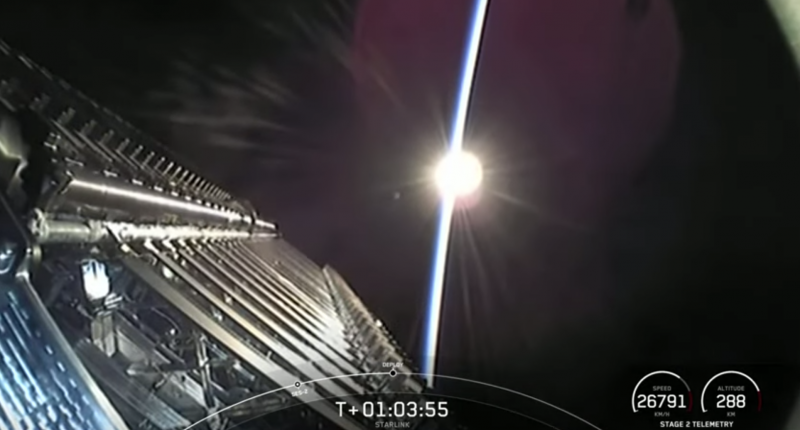Latest News

Starlink satellites before deployment on SpaceX’s March 24 Falcon 9 mission. Screenshot via SpaceX.
Viasat continues its opposition against SpaceX’s Starlink constellation on environmental grounds, and said in its latest filing to the FCC that if the commission does not stay its approval of SpaceX’s Starlink altitude change, Viasat intends to seek a stay from the U.S. Court of Appeals for the District of Columbia Circuit.
The issue in question is that the FCC granted SpaceX’s request to lower the altitude of future satellites in the Starlink Low-Earth Orbit (LEO) constellation. The FCC’s decision in April came despite protests from Viasat, Amazon, SES, and other satellite competitors.
Viasat had previously requested the FCC prepare an environmental impact statement on Starlink — a request the FCC denied as it approved SpaceX’s request.
“We believe the FCC failed to conduct a legally required environmental review under NEPA [National Environmental Policy Act] and did not honor the Biden-Harris administration’s commitment to a science-based approach to protecting the atmosphere, the Earth’s climate, space and the well-being of U.S. citizens before authorizing the launch of thousands of new Starlink satellites into low-earth orbit,” John Janka, Viasat’s chief officer of Global & Regulatory Affairs said in a media statement. “As such, we have asked the commission to stay its order until the federal courts review its legality.
Viasat’s request to the FCC was filed on May 21. In the filing, Viasat said if the FCC does not grant a stay on SpaceX’s approval by June 1, Viasat will seek a stay from the D.C. Circuit.
Viasat’s environmental objections to Starlink, detailed in its earlier filing, take issue with metallic compounds it says are left behind in the atmosphere when a satellite is deorbited that can lead to global warming. Concerns also include light pollution and collisions/space debris.
“These consequences warrant at least an environmental assessment [EA] before making a decision. Yet the commission did not even require SpaceX to prepare an EA, the most basic analysis under NEPA. Instead, largely ignoring Viasat’s arguments and evidence, the commission concluded that SpaceX’s unprecedented deployment of thousands of satellites did not even create the potential for a significant environmental impact. The D.C. Circuit is likely to set aside that decision,” Viasat said in the filing.
Viasat faces commercial competition from SpaceX’s Starlink service, and the operator acknowledged that in the filing, which dug into the harms the operator believes it will suffer from the increasing number of Starlink satellites.
The operator said its existing and planned space operations could be harmed by debris if a SpaceX satellite is involved in a collision; Starlink satellites crowd the orbital environment and require operators to spend more resources managing their satellites; SpaceX is taking up physical space in LEO that limits Viasat’s own ability to carry out LEO projects; and Starlink service will compete directly for Viasat’s satellite broadband customers.
According to the filing, Viasat believes the D.C. Circuit is likely to vacate the FCC’s order for failing to comply with NEPA.
Get the latest Via Satellite news!
Subscribe Now